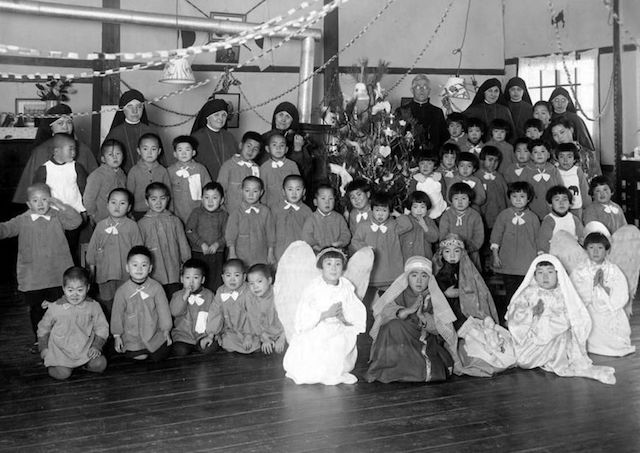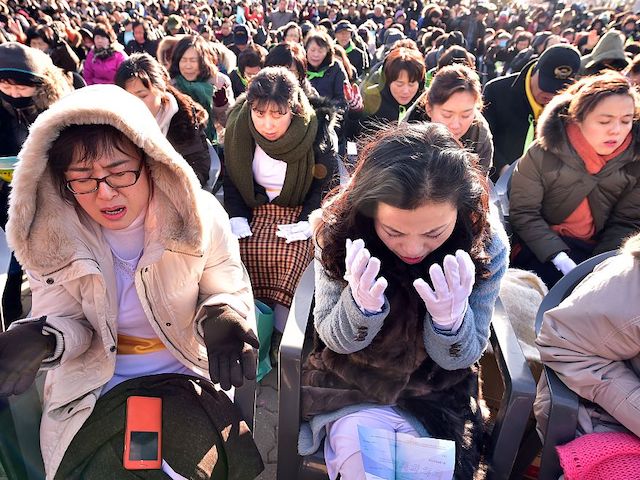As 2024 draws to a close, the world seems to lurch ever deeper into chaos. Wars rage without end, the great economic engines of the world creak and strain under the weight of massive debt, and at home, cultural divides have widened into chasms.
Christmas is known as a season of hope and love, yet for many, it becomes a stark mirror reflecting the emptiness of life. In the midst of a world unraveling with chaos, paired with the ache of personal alienation and isolation, Christmas can underscore the haunting questions at the heart of human existence. Meaninglessness and loneliness, entwined with a deep, unshakable anxiety about a world spiraling out of control, lay bare the soul’s struggle. This is the weight of the existential crisis that grips us all — a yearning for meaning and connection in a fractured, unmoored world.
But the deepest darkness of this world is where we can most clearly see the light that points us to the way out of our predicament.
For over 70 years, the North Korean regime has waged a relentless war against Christianity, imprisoning, torturing or killing millions of believers in an effort to erase their faith. Yet, against all odds, the faithful endure and their numbers quietly grow.
Today, Christmas Day, they will gather in secret — hidden in basements, closets, attics, and shadowed forests. With whispered hymns and quiet fervent prayers, they will honor a foreign King, fully aware that their devotion will one day likely cost them their lives, or at least their freedom. It’s a picture of Christmas, as it should be, the light of God piercing the darkness of the world and drawing hearts towards Him.
Is the Church Eternal in North Korea?
After working with the persecuted for 20 years, I've seen over and over again that nothing can stop God's church. In this ministry, you see the worst that the world has to offer, yet the gospel still goes forth.This is, perhaps, nowhere more evident than North Korea. The Kim regime has done everything in its power to squash the church. While the dictators have been responsible for dwindling the church's numbers, its members have become more dependent on the Lord, which is even more powerful.Through your generosity, we have been able to support believers in North Korea and reach the lost through radio broadcasts and other forms of gospel outreach. Thank you for helping us spread the Good News in the darkest places on earth.
Posted by International Christian Concern on Wednesday, April 3, 2024
The faithfulness and courage of these secret believers are undeniably inspiring, but they also offer a profound apologetic regarding the existence of the one they follow. He is the most unlikely of Kings.
He defies every expectation of worldly greatness. He was born into poverty and obscurity, far removed from the wealth and power that typically accompany the birth of royalty. He acquired nothing, never wrote a book, held an office, or commanded an army. He died abandoned and nailed to a tree at just 33. And yet, He reshaped the course of history, His life sparked a movement that would reach the ends of the earth and outlast empire after empire that attempted to kill off His memory.
Even the most hardened atheist is touched by His profound wisdom and the love so evident in His teachings, even if they scoff at the notion of his divinity. But what is it that inspires a faith so compelling that persecuted believers willingly risk everything to follow Him? The answer lies not only in his teachings but in a gift He left behind — a gift that transforms and empowers any soul it touches.
I’ve traveled to 80 countries including North Korea, and what strikes me most about the persecuted is a joy that completely defies their circumstances. C.S. Lewis described joy as the “secret signature” of God’s presence in the believer’s life, a yearning that transcends earthly answers and points to something eternal. He discovered this same joy during the most painful period of his life. It wasn’t a fleeting happiness but, rather, a profound sense of divine nearness, a foretaste of the world the believer is traveling towards.
A children’s Christmas play in Pyongyang, North Korea, on December 21, 1938. Prior to the rise of communism and the Korean War in 1950, Pyongyang was one of the world’s most Christian cities, often referred to as the “Jerusalem of the East.” (Pictures from History/Universal Images Group via Getty Images)
Over 2,000 years ago, in a lowly stable, surrounded by animals, a small family welcomed the Savior into the world. The air was heavy with the earthy smells of hay and livestock. His birth was announced not to kings but to shepherds — society’s most overlooked and marginalized. The King of Kings came into the world with no grandeur, no pomp, but in utter humility.
That night, light broke into the darkness, and hope entered the world. That hope though was not realized until he died. Just before facing the cross, He gathered his small circle of followers to tell them that He was going to leave them. He told them they shouldn’t be afraid because He was going to send a gift to the whole world but they would be the first to receive it.
It was the spirit of God, long promised in the scriptures. It would be accessible to all but not free. It was to be offered in a trade, available to any who would assess it properly.
Jesus said this gift would be a source of power and comfort to all who gained it. It would provide power for their lives, a secret current that flowed from heaven. It was and is, the only thing that can fill the existential hole in the soul that plagues the human heart.
Today, the underground church of North Korea gathered at great risk to honor the One who set them free, even as they live behind bars. Their gatherings aren’t just acts of devotion but a lifeline of survival. Like travelers huddled around a campfire in the depths of a bitter winter night, they draw warmth, strength, and courage from God’s Spirit, a light that cannot be extinguished.
South Korean Christians pray during a New Year’s service for the Korean peninsula’s reunification and peace at the Imjingak peace park at the border city of Paju near the Demilitarized Zone (DMZ) dividing the two Koreas on January 1, 2015. (JUNG YEON-JE/AFP via Getty Images)
These secret assemblies echo the shepherds and kings who once journeyed to a humble stable, kneeling in awe before the birth of a King like no other who entered our world in quiet humility, bringing hope and power that would change history. This King instills hope that defies every circumstance, He infuses the heart with a power that transforms even the weakest vessel.
He is the answer to the profound and unending ache in every human soul.
He is the still, small voice calling to us in the howling winds of life’s storms.
All who find Him, even in North Korea, move beyond survival and find what we crave so desperately: life, light and love.
Jeff King has served as International Christian Concern (ICC) (persecution.org) president since 2003 and is one of the world’s top experts on religious persecution. He has advocated for the persecuted everywhere, testifying before the U.S. Congress on religious freedom. He has been interviewed or quoted by most of today’s leading media outlets such as the New York Times, the Wall Street Journal, the Washington Post and The Washington Times. He is a three-time author and is available as a guest speaker. Jeff is also the host of “Faith Under Fire,” a podcast dedicated to helping Christians deepen and defend their faith. To learn more, go to the Jeff King Blog.

 By Breitbart News Network | Created at 2024-12-25 14:12:14 | Updated at 2024-12-29 01:34:20
3 days ago
By Breitbart News Network | Created at 2024-12-25 14:12:14 | Updated at 2024-12-29 01:34:20
3 days ago





![[Nefarious Activities via Manipulating CRS Reports to Congress] Revisiting the Congressional Research Service 2016 nbC Report](http://www.freerepublic.com/images/shotheard.jpg)


